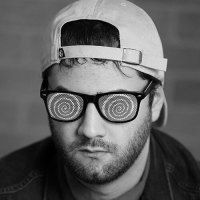Portlandia in Real Life: The Visual Musician
As we count down to Portlandia's season premiere, we look at some of the real people who help "Keep Portland Weird."
In 2011, the Independent Film Channel (IFC) launched “Portlandia,” the brainchild of former SNL cast member Fred Armisen and singer Carrie Brownstein, a show devoted to fictional characters inhabiting the city of Portland, Oregon.
In 2012, I set out to find the real personalities who bring life to a city that is quickly becoming America’s hipster paradise, or as Fred Armisen says “a city where young people go to retire.” This series—a spotlight of the people who “Keep Portland Weird”—was originally published by the now defunct New York-based cult magazine, Alt Variety. In anticipation of Portlandia’s fifth season, Den of Geek is running the series in its entirety.
When the spotlight’s ray of attention points toward Marci, she turns her back to the audience. She isn’t being disrespectful and the stage doesn’t frighten her. Marci’s eyes must be shielded from the light because she is preparing to pull music organically from deep within as she channels the thump of an Old World bass line or the clamor of sultry blues notes rising from a keyboard.
Eight years ago, Marci—who goes by her stage name, Sugar Moon—realized that she had synesthesia, or the ability to take music and visualize colors and sights inside her head. This allows the Portland-area singer to use her voice to channel the musical vibes of the different groups of musicians or “jams” she plays with. As an experimental vocalist, Marci improvises every word that comes through her body. While her sound is an acquired taste, she represents the underground artists out in Portland who are fusing every sound imaginable.
Recently, Marci has used spontaneous fusions of Irish, gypsy, eastern European music and early Hindu influences during her performances in Portland bars, on the streets or in the more intimate house-party setting.
“Sometimes it’s an abstract painting and sometimes it’s a movie but the music actually moves the picture,” Marci says. “I see the musicians in the room are a little discordant or not matching and I’ll see what they’re playing like a painting and I’ll use my voice to pull them together. Maybe it’s a rhythmic thing I’ll do or a sound I’ll copy to pull it to another person. It’s natural. I’ve always done it but I was never really conscious of it.”
As a college professor of communication studies at Clark College in Washington, Marci teaches her students the value of letting others shape what comes out of them. Listening, she says, is at the core of improvisation. “Many people get into music and it’s all about them,” she says. “They do not know how to listen.”
Marci is a teacher who practices what she preaches. On stage, Marci’s voice is an instrument and she doesn’t believe vocals should take precedent over any other instrument as it almost always does in mainstream music. “When I work with jazz musicians they quiet down because they think my voice has to go over the top but I want to play underneath too,” she says. “I like to come out on top then go underneath and support someone else. I’ll be the bass or I’ll be the drummer with my voice.”
In most cities, Marci’s act would be considered a sideshow. In Portland’s “crazy,” “eclectic as hell” underground scene, Marci found the ideal incubator for her special talent.
“Edgy, edgy, edgy,” boasts Marci, describing the instrumental cocktails mixed in the Portland music scene. This isn’t anything like Seattle’s grunge dominance of the 90s or the pop country phenomena rolling through the south. Out in Portland, Marci is one of many artists “fusing” eclectic rhythms and discordant sounds to create something soulful yet raw, but if nothing else, unique.
“I was exploring an edge, an edge for me is to listen to more indigenes music, people who live more closely to the earth and to get those sounds very earth centered,” she says. “My fantasy is to get money or funding to go to the last of the indigenes cultures and sit down and improvise with them. They’ll infuse me and I’ll improvise with that. That’s my edge. Everyone has their own edge.”
Know someone who would make a great Portlanda in Real Life story? Find Chris Longo on Twitter and let him know!

